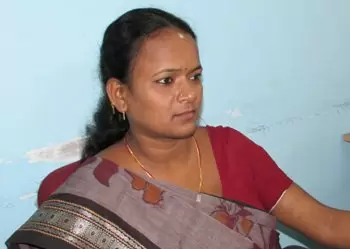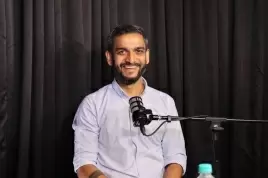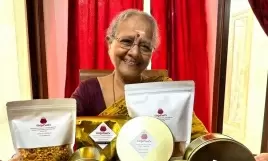“People from all walks of life need to join us in our mission”
13-December-2013
Vol 4 | Issue 50
In Odisha, if you enter a State Aids Cell, any Integrated Counselling and Testing Centre (ICTC) or the block offices, there is one poster that is sure to catch your eye – that of a HIV positive woman articulating the message: ‘Do not feel abandoned, do not feel alone, speak out, there are thousands of positive people like you. Come join hands, we are here to help and assist you’.
The woman in the poster is Prabhasini Pradhan, president of the Kalinga Network for People Living with HIV/AIDS, who has no regrets about revealing her identity for the campaign.
 |
|
Prabhasini Is the inspiring face Of HIV In Odisha (Photos: Rakhi GhoshWFS)
|
She is confident of who she is and there is nothing more that she wants than to fight for the rights of HIV positive people like her who are usually at the receiving end of discrimination and social contempt.
She remarks, “I am not responsible for the situation I am in today, but I am blamed for it. Why should I cover my face; have I done anything wrong?”
Of course, a decade ago Pradhan was a very different woman – unsure of her future and scared to talk about her disease. She can never forget the fateful day her husband of three years, who was working in a factory in Mumbai, tested HIV positive.
“It was March 14, 2003. I was really taken aback with the results of his report. And then came the second blow: two days later, my test report too confirmed my positive status,” she recalls.
Fifteen days later her husband died suddenly, leaving her solely responsible for their one-year-old baby girl. That was the beginning of one of the toughest phases of her life.
Elaborates Pradhan, “After my husband’s death, I went to my in-laws home in Tarimi village which falls under Chilika Block of Khurdha district. I was not allowed to participate in any of the rituals associated with his last rites.
“They thought they would catch the disease from me so nobody even talked to me. All my belongings were thrown out of the house. They behaved as if I was an untouchable. Moreover, they didn’t even accept their granddaughter although she had tested negative.”
Pradhan’s in-laws threw her out of their home forcing her to go back to her natal village. There she tried to find work to ensure a decent childhood for her daughter.
“I tried tailoring clothes for a while and took tuitions for small children to earn some money. We were managing somehow when the local people got to know of my positive status. Once again, we found ourselves being shunned,” she recalls.
Although Pradhan’s test report was positive, she couldn’t come to terms with her status and the misfortune that had befallen her because of it. So, in 2004, she travelled all the way to Bhubaneswar to get another test done. That trip turned out to be the turning point in her life.
She says, “I met an ICTC counsellor and she helped me deal with the trauma I was going through. She told me that there are hundreds of people living with this virus and she invited me to come for a meeting of OSACS (Odisha State Aids Cells). There I met Amarendra Behera and Ajay Samal, two positive persons, whose life stories inspired great confidence in me.”
That meeting led to the formation of the Kalinga Network for People Living with HIV/AIDS, which was formally it registered in 2006.
“Initially, we were seven members and I was the only woman. Now there are 5,000 members, including thousands of women.”
Pradhan, incidentally, is the first positive woman in the state whose poster carries a message urging positive people to fight for their rights.
The primary reason behind the setting up of the Kalinga Network is to create awareness about the disease, especially among positive people. Information regarding government schemes, health and education facilities and other benefits is regularly given to them so that they can lead a better life.
Adds Pradhan, “HIV positive people live in shame, depression and do not speak up for their rights; we give them the confidence to do so.”
Besides counselling, the Kalinga Network, which has centres at Sambalpur, Bargarh, Angul, Bhadrak, Puri, Koraput, Nayagarh and Kendrapara districts, organises camps on capacity building and advocacy. It also provides vocational training for positive people.
.webp) |
|
The Kalinga Network for People Living with HIV/AIDS has over 5000 members and it helps positive people fight for their rights and entitlements
|
It has a detailed list of the number of positive people in the state enabling it to reach out to those in need.
“With our efforts today positive children are getting Rs 1000 from the state government’s Women and Child Development Department for their education, nutrition and hygiene. Around 20 children are getting this amount now, with many others are in pipeline,” informs Pradhan.
Moreover, in a conservative state like Odisha, where families and friends do not easily accept people living with HIV, this group has even managed to arrange the marriages of three couples, one of whom was recently blessed with a baby girl who tested negative.
Pradhan, who lives in Bhubaneswar with her daughter, admits that although initially she was depressed at being HIV positive, now she feels that her condition has proved to be a boon.
“God has given me an opportunity to help and understand other positive women and fight for their rights,” she observes with a smile.
Pradhan signs of with these words, “People from all walks of life need to join us in our mission to ensure a better life for those living with HIV/AIDS. Their support will give us the strength and confidence to believe in ourselves and our ability to fight against all odds!” - Women's Feature Service
















